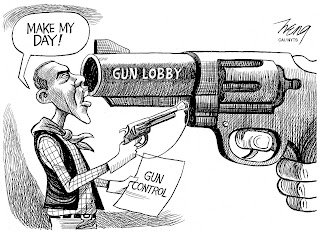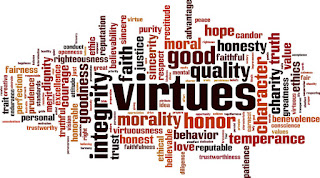A634.8.3.RB- Gun Control: What is the Answer?
In recent years, we have witnessed many tragedies with respect to guns in the workplace. Do citizens have a right to bear arms? Answer the question in your reflection blog. State your opinion and follow up your position with supporting documentation. Next, present the opposing side to your stance. Use external sources to enhance your claims.
The right to bear arms is one of the
most debated topics of all time. Early on the right was more of a survival
aspect I believe, but in the years to follow has been blown way out of proportion.
For like most people in support of this right I tend to focus not so much on
the gun ownership value and most on the freedom. I could definitely get on
board with an agenda that modifies gun control but don't necessarily support a
principle that starts to remove freedoms, because when then will it stop? So
I'm in support of modifying the specific topic about guns, but don't support
that very notion because it will likely lead to other stripped freedoms. Kind
of sounds like an unfounded slippery slope: fully acknowledge this but still
want to stick with some core values.
Others may argue my viewpoint
because I do however stand for a modification of the first amendment as written
in previous articles. The specific piece to the first amendment I'd like to see
rewritten being the freedom of the press. So how can I support modification
here that is again binding to the very same notion but not support it through
gun control? This is difficult to explain because some things in your gut just
don't necessarily make sense. I don't like the notion that redacting parts of
freedom of the press because they also could start a snowball effect that
modifies other freedoms, but I'm willing because of the greater harm the press
has though political propaganda. Now it's even more ironic to say "more
harm" because of the deadly principle that guns are founded. Man, the more
I write the harder it becomes to support these notions. Let's see what other
folks have to say.
LaFollette (2007) helps me to
understand my dilemma from his descriptions about "tipping the
scales" (p. 179). This is where some people support specific notions of
the argument but don't like all the lingering baggage that comes along with it.
Perfect example is our current COVID relief bill that goes before the senate really
soon. I don't think anybody isn't in support of COVID relief but this bill only
has about 10% of the provision providing direct support. So when do you tip the
scale in a decision? Apply this to gun control from a body count like COVID. Is
it a thousand dead, ten thousand, a million before one decides to tip the scale?
How then do we satisfy a need to cut the baggage? The topic is really just the
tip of the iceberg because of just the depth and breadth the topic becomes. In
the Army we call these wicked problems because they really cannot be solved.
Bring the gun to the workplace and
now we have a whole new set of variables to contend with. Now open carry a
weapon at work and the topic goes off on a whole new tangent. Have your CEO
open carry and what message does that say about his vision on a defensible
culture? Sorkin (2019) mentions that CEO's are getting all too tired about
legislators failing to hear the common sense that the people have been
screaming. You can flip these cards for hours and days about one simple notion
and turn it into thousands of different dilemmas that may or may not even
support your original topic at hand. This to me is just like virus variants.
You have your initial point of contention that get modified but yet carries
some of the initial code into another situation, modifies again and now carries
less code of the host but still carries its original title.
Shepardson (2020) brings the argument
from a justice perspective. "Banks, credit card companies, and retailers
have unique insight into the behavior and purchasing patterns that can help
identify and prevent mass shootings." He also claims that "The red
flags are there—someone just needs to be paying attention." So why aren't
we paying attention? Are the people really screaming about this topic or are
people really just on a scale that keeps flopping left and right because of all
the baggage that is being piled on or how the true information is being
portrayed? Have we lost sight of a core values because we fail to actually see then
due to the fact that so many barriers have blinded us? Bottom line in this
argument is that it's hard to pinpoint anything specific but will definitely concede
to the fact that there are many flavors of freedom that don't taste very good
at all, but then again at least we are still free to taste.
LaFollette, H. (2007). The Practice of Ethics. Malden, MA: Blackwell.
Shepardson, N. (2020). Should banks be in the gun control business? Retrieved from https://reason.com/2020/01/20/should-banks-be-in-the-gun-control-business/
Sorkin, A. (2019). 'Simply unacceptable': Executives demand senate action on gun violence.
Retrieved from https://www.nytimes.com/2019/09/12/business/dealbook/gun-background-checks-business.html



Comments
Post a Comment